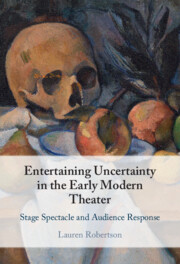Book contents
Chapter 2 - Time
from Part I - Dramatic Action
Published online by Cambridge University Press: 02 February 2023
Summary
Chapter 2 argues that the early modern theater’s techniques for the production of narrative suspense emerged from its cultivation of spectators’ phenomenological uncertainty. Attending to moments of temporal suspension in history plays, including Christopher Marlowe’s Edward II, William Shakespeare’s Richard II, and John Ford’s Perkin Warbeck, the chapter shows that theater practitioners regularly aimed to resist the unrelenting forward momentum of live performance by grinding dramatic time to a halt. Narrative suspense was especially hard to come by in the history play, which emerged as a new genre in the 1590s by dramatizing well-known chronicles of English kings. But the playgoers who flocked to theaters to see these stories of succession were living through a succession crisis of their own, for Elizabeth I’s lack of an heir rendered England’s dynastic future crucially opaque. The theatrical invitation to unknow England’s past trained spectators in speculative thinking oriented toward their own politically uncertain future. History plays transformed the anxious wait for Elizabeth’s successor, that is, into the pleasure of theatrical possibility.
- Type
- Chapter
- Information
- Entertaining Uncertainty in the Early Modern TheaterStage Spectacle and Audience Response, pp. 71 - 110Publisher: Cambridge University PressPrint publication year: 2023

